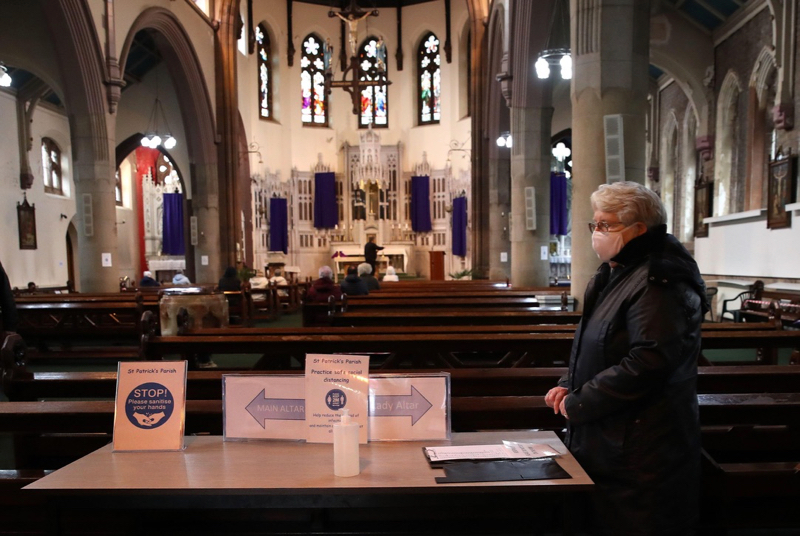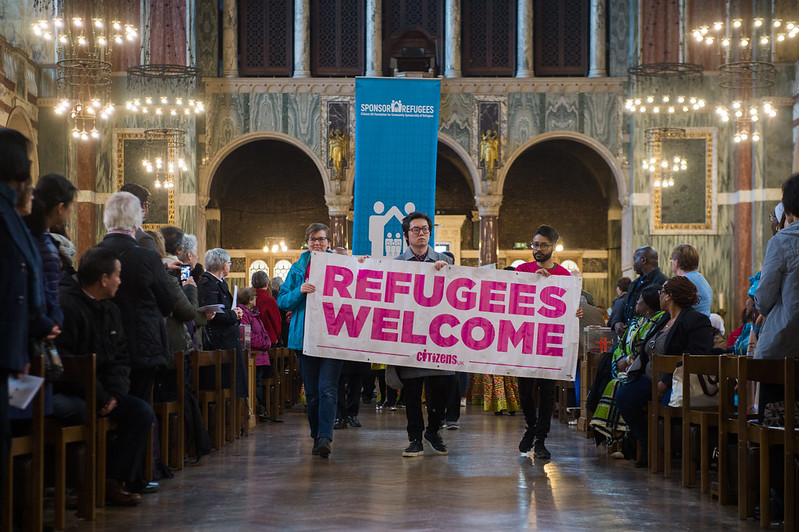St Mary’s University, based in Twickenham, is opening a campus in Edinburgh in partnership with the Archdiocese of St Andrews and Edinburgh. Teaching will begin in September, when students will be able to attend taught postgraduate programs in Catholic education, school leadership or theology. The new campus will be based in the Gillis Centre, formerly St Margaret’s Convent and School. Fr Michael Dolman, Vocations Director and Director of Ongoing Formation of Clergy for the Archdiocese of Birmingham, has been appointed the new Rector of St Mary’s Collect, Oscott. He will take up his appointment on Thursday 1 July 2021. Fr Michael takes over from Acting Rector Fr Paul Keane, who took over following the death of former Rector, Canon Giles Goward, in January.
The Government is reported to be considering allowing the resumption of public Masses with up to 50 people from mid-May. However, according to a report in the Irish Independent there will be no increase in the number allowed to attend a funeral mass or wedding, which rises from 10 to 25 this week. Last week, the head of the Irish Church, Archbishop Eamon Martin met the Minister for Health, Stephen Donnelly, to convey the Church’s concerns following the publication of a new regulation criminalising the leading and gathering for public worship. The Archbishop emphasised to the Minister that the vital pastoral work of priests and other ministers on the ground should be deemed essential, rather than subject to penal sanction. Archbishop Martin also stressed the importance of regular and meaningful consultation between Church, State and public health advisers to ensure that there is mutual understanding and positive cooperation during the Covid-19 crisis. The Taoiseach, Micheál Martin, denied in the Dáil last week that the Government was in any way anti-religious.
Professor Mary McAleese has called for a new theology for the Sacrament of Confirmation that would form part of a catechesis of invitation rather than the current catechesis of obligation. Answering questions after delivering her address, ‘Children, religion and the earth they will inherit’ as part of New College, University of Edinburgh’s 175th anniversary celebrations, the Professor of Children, Law and Religion at the University of Glasgow, spoke about children’s rights in the UN Convention on the Rights of the Child. The Vatican is the only faith system to have signed up to the Convention which incorporates freedom of conscience, opinion, belief and religion, including the right to change religion. Discussing the repercussions of infant baptism, which is required by canon law, and the obligations it imposes on the baptised from infancy, she suggested that Confirmation could become “the sacrament at which the adolescent child or the adult decides this is where I commit to this Church with a sentient informed conscience”. She referred to Bishop Brendan Leahy’s suggestion (in 2015) that the sacrament should be postponed until at least the age of 16. Professor McAleese recalled making her confirmation when she was nine. “Nowadays, many children don’t bother turning up for Confirmation, just as many of them never turn up again for Mass again after First Communion.” She said Bishop Leahy’s suggestion “sounded very like he was working towards a catechesis of invitation, not obligation”.
The Irish Bishops Conference has produced a new relationship and sexual education (RSE) programme for Catholic primary schools in Ireland. The RSE Primary Programme is called ‘Flourish’ and it is available for use in all classes, from Junior Infants to Sixth Class in Catholic primary schools. It includes lessons on topics like safe internet usage, puberty and LGBTQI people. An introductory document entitled ‘The vision for RSE in Catholic primary schools’ says it is the duty of RSE in the Catholic school to help children develop a moral conscience around their internet usage for their own good and that of others. Elsewhere the document says on the issue of LGBTQIs that the Catholic school must consider these topics within a moral framework that reflects the teachings of the Church. It states that the RSE programme must not promote shame, but rather seek to affirm that every human being is made in the image and likeness of God and is loved by God as they are. “The same moral obligation to respect and treat our bodies with dignity applies to people of all sexual orientation. However, the Church’s teaching in relation to marriage between a man and a woman cannot be omitted.”
The leader of Irish political party Aontú has called on President Michael D. Higgins to withdraw his “parcels of hate caricature” of the education system in Northern Ireland. Peadar Tóibín said division in Northern Ireland was the result of partition and that blaming schools for sectarianism was “an incredible example of revisionism”. In an interview with RTE’s Late Late Show, President Higgins said segregated education in Northern Ireland could no longer be justified in light of the recent rioting involving young people who were born after 1998’s Good Friday Agreement was signed. He said educating pupils based on their religious background was “abandoning them to parcels of hate and memory that others are manipulating”. However, Peadar Tóibín said division was the result of partition and “decades of an Orange State discriminating against Nationalists and Catholics in terms of housing, jobs and rights”. “Catholic schools have often been the only place that an element of Irish geography, history, language and culture which extends beyond the six counties was available,” Mr Tóibín said, and he paid tribute to Catholic schools for integrating Portuguese, Polish and Lithuanian children into their classrooms and communities. “In no school in the North of Ireland are educators instructed to ‘manipulate’ the memory of any child,” he said.
The London dioceses of Southwark, Westminster and Brentwood will celebrate the 16th Annual Mass for Migrants on Saturday 1 May at 11.30am. Chief celebrant will be Bishop Paul McAleenan, the Church’s lead on migrants and refugees, and it will be live-streamed from St William of York Catholic Church, Forest Hill, South East London. Participation can be in person or online. The three dioceses come together annually to give thanks for the international nature of London churches and for the work that migrants contribute to society. The Mass includes prayers and music that embrace various ethnic communities. Social distancing, facemasks and other Covid measures are in place for those going in person.
The Diocese of Plymouth has launched its environmental policy, saying that care for God’s creation, “needs to be integrated into the life and mission of our Diocese.” There are commitments to foster “ecological conversion” and to “advocate for and work with people on the margins and people living in poverty.” Church buildings and practices will reduce use of Earth’s natural resources, re-using and recycling where possible. Ethical investment is a priority, and ecological education promoted in parishes and schools. Biodiversity within all Church-owned grounds and gardens will be nurtured. The policy is to be reviewed annually by a Diocesan Committee reporting to the Bishop’s Council and Trustees. Bishop Mark O’Toole of Plymouth issued a Pastoral Message on the first Diocesan Environmental Policy last week. He stressed the importance of responding to “serious environmental challenges” and the imperative from Pope Francis in Laudato Si’ to ‘hear the Cry of the Poor and the Earth’. He said, “as individuals we can all play our part and, collectively, we can do a great deal.” Plymouth is the sixth Catholic diocese in England and Wales to have an approved environmental policy. The others are Salford, Hexham & Newcastle, Middlesbrough, Liverpool, and Leeds.
The National Justice and Peace Network (NJPN) annual conference 23-25 July still plans to go ahead face to face. Lord Deben, Chairman of the UK’s independent Committee on Climate Change, has now joined the list of speakers on the theme, ‘2021: Life on Earth – moment of truth’. Others include Lorna God, Chair of the Global Catholic Climate Movement, and Bishop John Arnold, lead bishop in England and Wales on Environment. CAFOD’s Director Christine Allen is the chair. Workshops will look into ‘Just Transition’ in the lead up to COP26 in Glasgow, and other issues such as ‘Sustainable Development Goals’, ‘Water Management in a Changed Climate’ and ‘Conflict and the Environment’. Inspired by Laudato Si’, the conference aims to equip people in the justice and peace movement to address the root causes of all symptomatic concerns for justice, peace and the integrity of creation.
The Bishop for International Affairs, Declan Lang, has welcomed a decrease of 26 per cent in the number of executions carried out worldwide, as revealed in Amnesty International’s Annual Death Penalty Statstics. The number is likely to be much higher, as this does not include states that keep information about executions secret. Bishop Lang said there is more work to do to, in keeping with the Church’s opposition to the death penalty. Praying for those who have been killed, their families and loved ones, he said: “Let us never forget that behind every statistic is a human being made in the image of God.”
Catholics are preparing for Laudato Si Week 16-24 May, which will mark the sixth anniversary of Pope Francis' encyclical letter on Care for our Common Home. Catholics across Scotland are holding an online evening of reflection on 24 May, titled ‘Everything and Everyone is Connected’ and hosted by SCIAF and Justice and Peace Scotland. It will look towards the G7 summit in Cornwall in June and November’s COP26 climate change talks in Glasgow and how faith inspires action to respond to the climate crisis. London-based Laudato Si animator John Woodhouse is helping prepare the launch of the 7 year Laudato Si platform on 24 May, initiated by the Vatican Dicastery of Human Development. The Lent Global Healing course reached 900 people and they are helping “to galvanise parishes, with 24 people in England undertaking the current Laudato Si animators course. “We are forming diocesan groups working with CAFOD and Justice and Peace representatives to promote to the parishes and families initially,” said John, and “our network of parish reps is gradually growing.” The Laudato Si Week website https://laudatosiweek.org/ offers a calendar of daily events, organised by the Global Catholic Climate Movement which anyone can join. The Friday is a ‘Global Day of Action for our common home’. Saturday offers ‘Songs for Creation’ on World Biodiversity Day. CAFOD provides a background to issues raised in Laudato Si’ and liturgy/prayer resources for the week.



 Loading ...
Loading ...